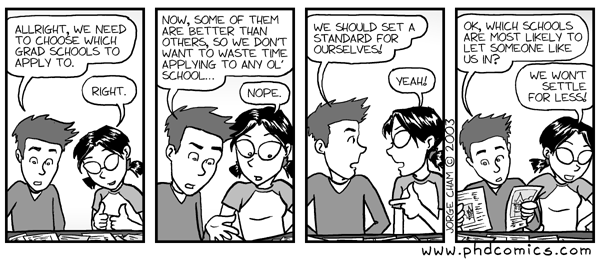

|
Homepage: http://jmvidal.cse.sc.eduHomepage: http://jmvidal.cse.sc.edu/csce782/
Office: SWGN 3A51
Office Hours: Check my Calendar, or email me for appointment.
Email: vidal@sc.edu
Grading:
| Item | Percentage |
|---|---|
| Tests (2) | 25% each, for a 50% total. |
| Final Project | 30% |
| Problem Sets (3) | for a 20% total. |
We will adhere USC's statement on academic responsibility. This means that expulsion procedures will be initiated for anyone caught either giving or receiving help in a problem set or test. I will be grading everything myself since this class does not have a TA. Please, try to help out by properly commenting your code.
Problem Sets: All problem sets are to be done individually and will likely involve the use of netlogo to solve a multiagent problem. All problem sets will be graded based on the quality of the writeup up: the quality of the writing, the originality of the ideas use, the simplicity of the code, and the performance of the system.
Tests: There will be two tests. They cover the material discussed in class.
Final Project: The final project will consist of writing a research paper. The project can be done individually or by a pair of students; bigger groups are disallowed.
Overview: This class will provide a solid foundation in the field of multiagent systems design and engineering. We study all the major MAS design techinques, agent architectures, and communication languages. We take a hands-on approach by building many NetLogo simulations of well-known problems. The class, therefore, has two components: theoretical and implementation. The theoretical component includes the lectures, readings from the textbook and papers, and several problem sets. The implementation component includes the programming assignments and final project.
Prerequisites: You will do better in this class if you have taken an introductory AI class and possess some mathematical sophistication.
Deliverables: Students who pass this class are able to design and implemented complex solutions for distributed, real-time, noisy problems that require the coordination of independent and possibly selfish autonomous units. The students have in-depth knowledge of the most common agent models, coordination protocols, and the mathematics required to understand coordination, cooperation, and mechanism design. They also have in-depth knowledge of game theory and economic theory as they apply to the design of incentive-compatible protocols.
